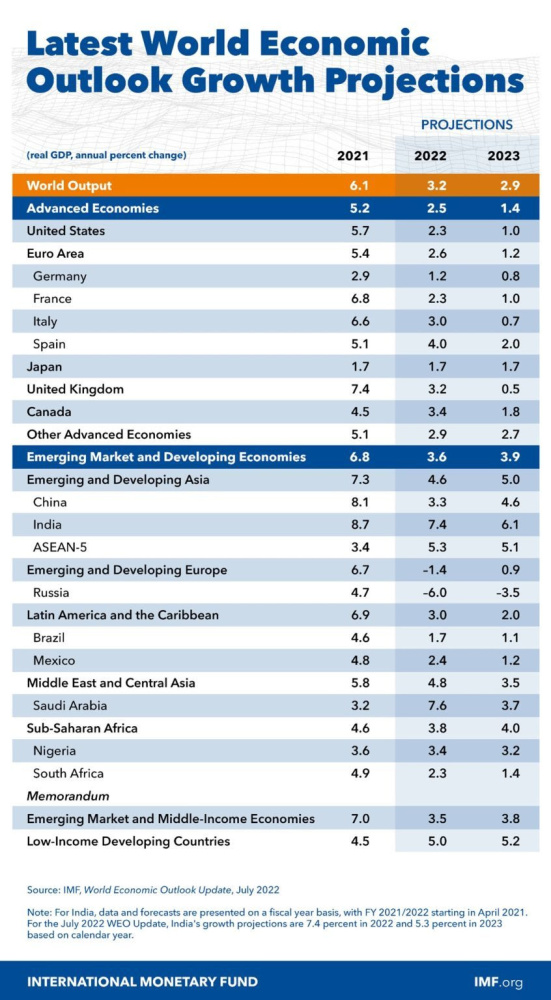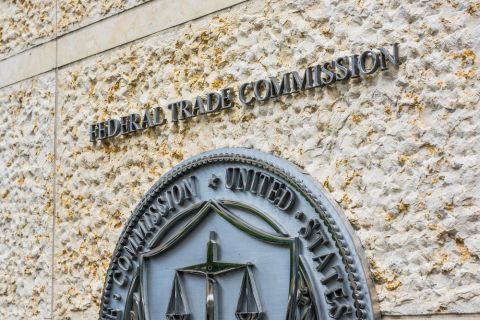
As global economies continue to boost interest rates to combat inflation and financial conditions continue to tighten, domestic policies “to address the impacts of high energy and food prices should focus on those most affected without distorting prices,” the IMF said. (Source: Hart Energy, Shutterstock.com)
The Washington-based International Monetary Fund (IMF) warned of a more pessimistic economic outlook for the global economy and an increased risk of a global recession as economies from the U.S. to Europe feel the impacts of the pandemic and an ongoing war in Ukraine.
“The global economy, still reeling from the pandemic and Russia’s invasion of Ukraine, is facing an increasingly gloomy and uncertain outlook,” the IMF announced July 26 in a new blog, adding that its outlook “has darkened significantly since April.”
Russia’s invasion of Ukraine has added additional stress on supply chains already stretched by the pandemic while restrictions on Russian energy exports have spurred food and energy inflation due to higher electricity, gasoline and diesel costs. In response, IMF recommended governments turn to fossil fuels only as a “stopgap measure” due to mitigating climate change and limiting emissions.
The IMF’s baseline economic forecast reveals a global slowdown this year and next compared to last year. Gross domestic product is forecast to reach 3.2% in 2022 and 2.9% in 2023, down 0.4% and 0.7% respectively from April. This compares to economic growth of 6.1% in 2021.
The lower economic growth prospects are due to slowdowns in the world’s three largest economies including the U.S. which saw reduced household purchasing power and tighter monetary policy, China with further lockdowns and a deepening real estate crisis and the euro area with continued spillover from the Ukraine war and tighter monetary policy, the international financial institution said.
“Higher-than-expected inflation, especially in the United States and major European economies, is triggering a tightening of global financial conditions,” the IMF said. “China’s slowdown has been worse than anticipated amid COVID-19 outbreaks and lockdowns, and there have been further negative spillovers from the war in Ukraine. As a result, global output contracted in the second quarter of this year.”

Stopgap Energy Measures
As global economies continue to boost interest rates to combat inflation and financial conditions continue to tighten, domestic policies “to address the impacts of high energy and food prices should focus on those most affected without distorting prices,” the IMF said highlighting the ongoing energy transition and issues impacting the shift to cleaner energy sources.
“Mitigating climate change continues to require prompt multilateral action to limit emissions and raise investment to hasten the green transition,” the blog said, adding that the Ukraine war coupled with rising energy prices has put additional pressure “on governments to turn to fossil fuels such as coal as a stopgap measure.”
Europe’s energy crisis continues due to reduced energy inflows from Russia. Increased demand in Europe and worldwide for energy other than from Russia has helped the U.S. boost its standing as the world’s largest LNG exporter amid robust shale production, according to data revealed this week by CEDIGAZ, the French gas intelligence entity. Yet, efforts in the U.S. and worldwide still needed to focus on reducing emissions, the IMF said.
“Policymakers and regulators should ensure such [stopgap] measures are temporary and only cover energy shortfalls, not increase emissions overall… the energy crisis also illustrates how a policy of clean, green energy independence can be compatible with national security objectives,” the institution added.
Recommended Reading
Sunoco’s $7B Acquisition of NuStar Evades Further FTC Scrutiny
2024-04-09 - The waiting period under the Hart-Scott-Rodino Antitrust Improvements Act for Sunoco’s pending acquisition of NuStar Energy has expired, bringing the deal one step closer to completion.
Some Payne, But Mostly Gain for H&P in Q4 2023
2024-01-31 - Helmerich & Payne’s revenue grew internationally and in North America but declined in the Gulf of Mexico compared to the previous quarter.
Kimmeridge Fast Forwards on SilverBow with Takeover Bid
2024-03-13 - Investment firm Kimmeridge Energy Management, which first asked for additional SilverBow Resources board seats, has followed up with a buyout offer. A deal would make a nearly 1 Bcfe/d Eagle Ford pureplay.
Laredo Oil Subsidiary, Erehwon Enter Into Drilling Agreement with Texakoma
2024-03-14 - The agreement with Lustre Oil and Erehwon Oil & Gas would allow Texakoma to participate in the development of 7,375 net acres of mineral rights in Valley County, Montana.
SLB’s ChampionX Acquisition Key to Production Recovery Market
2024-04-21 - During a quarterly earnings call, SLB CEO Olivier Le Peuch highlighted the production recovery market as a key part of the company’s growth strategy.






